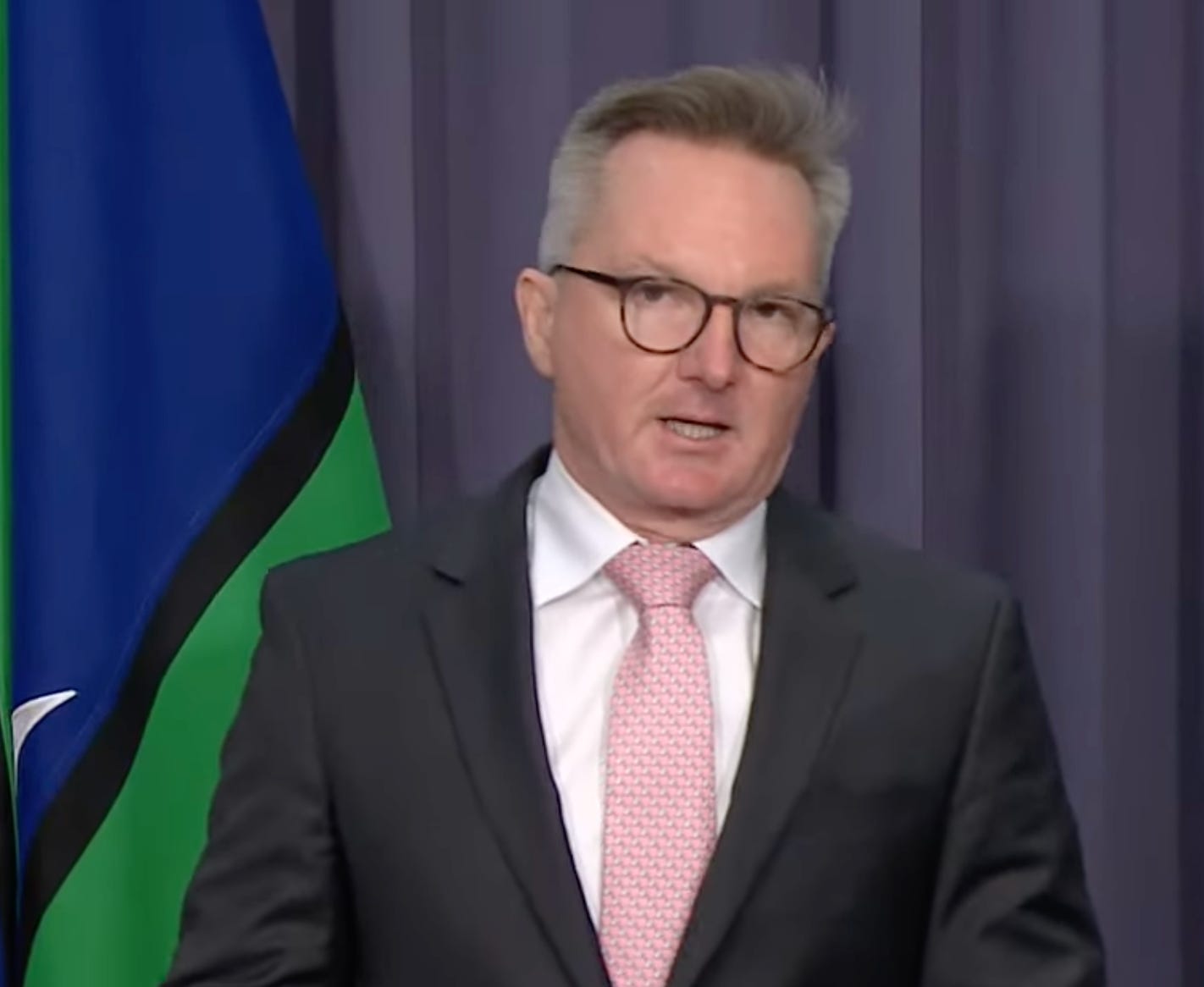Government Releases Comprehensive Climate Report Warning of Catastrophic Impacts Across Australia
Today’s email is brought to you by Empower your podcasting vision with a suite of creative solutions at your fingertips.
Climate Change Minister Chris Bowen released the most comprehensive analysis of climate change impacts on Australia ever compiled Monday, warning that natural disasters will increase dramatically while 1.5 million people face coastal flooding risks by 2050.
The Australian Climate Service report, spanning over 1,000 pages, describes climate impacts as "cascading, compounding, concurrent" and warns that no Australian community will escape the effects of rising temperatures.
"There isn't an Australian community that isn't impacted by climate change going forward, and there isn't an Australian individual for whom those impacts won't be real and material," Bowen said during a press conference at Parliament House.
The report examines three global warming scenarios of 1.5, 2 and 3 degrees celsius and concludes that natural disasters will increase most dramatically in Queensland, New South Wales, the ACT and Tasmania.
Truth matters. Quality journalism costs.
Your subscription to Mencari directly funds the investigative reporting our democracy needs. For less than a coffee per week, you enable our journalists to uncover stories that powerful interests would rather keep hidden. There is no corporate influence involved. No compromises. Just honest journalism when we need it most.
Not ready to be paid subscribe, but appreciate the newsletter ? Grab us a beer or snag the exclusive ad spot at the top of next week's newsletter.
Coastal Communities Face Major Risks
By 2050, the number of coastal communities in high and very high risk areas will increase substantially, with 1.5 million people impacted by sea level rise, coastal erosion and other effects if current population levels remain unchanged.
The report predicts Brisbane will experience flooding 300 days per year while Fremantle faces flooding 200 days annually under higher warming scenarios.
"The pattern of natural disasters that Australians are used to is not a reliable guide to the future," Bowen said. "Some natural disasters will occur more frequently and in places and at times they haven't previously been common."
Western Sydney and outer suburbs of other capital cities will experience longer heatwaves with associated health impacts, while northern Australia faces multiple worsening natural disaster risks.
Economic and Infrastructure Impacts
The report warns that insurance availability and affordability will worsen, creating flow-on effects across the economy. Property market values could face losses exceeding $600 billion due to climate risks.
Telecommunications assets face particular exposure to extreme weather events, while extreme heat will reduce productivity for outdoor workers.
"The availability and affordability of insurance will worsen with flow on impacts across the economy," Bowen said, noting that insurance markets in some Australian regions are already challenged.
Agriculture faces significant threats, with the report stating farm productivity and profits "have a lot at stake" under all warming scenarios. Whether cropping, horticulture, cattle, sheep or fisheries, regional Australians will be "big losers from unchecked climate change."
Health System Pressures
Public health risks will become more pronounced with "significant potential for loss of life and strain on health systems," according to the report.
The document predicts Australians will experience loss of important ecosystems and species by mid-century, while oceans around Australia will become more acidic with longer marine heatwaves affecting ecosystems.
Assistant Minister Josh Wilson emphasized the report involved over 2,000 participants and 250 climate risk experts across 40 roundtables.
"They show that delay and denial would be enormously costly and harmful to our social, economic and environmental wellbeing," Wilson said.
National Adaptation Plan Released
Bowen simultaneously released the National Adaptation Plan, describing it as "the next step forward in the national conversation about adaptation, not the first step, not the final word."
The government has spent $3.6 billion on climate adaptation since taking office, with up to $9 billion on measures relating to adaptation, resilience and disaster management.
"This is an issue that governments of all persuasions, of all levels, but not just governments, the private sector, industry, business, communities, households will need to work together on in coming years," Bowen said.
The adaptation plan provides a framework for coordinating responses across government levels and industry sectors.
Climate Targets Decision Imminent
Bowen confirmed receiving advice from the Climate Change Authority on Friday regarding Australia's 2035 emissions reduction target, saying he would announce the decision "soon."
"I received it on Friday afternoon. I'm working through it. I'm giving it due and proper regard," he said. "You won't be the first to know what my recommendation is. The Cabinet will be the first to know."
The minister acknowledged the target would be "controversial by definition" with some considering it too low and others too high, but promised it would be achievable and ambitious.
International Context
When questioned about declining global momentum on climate action, Bowen maintained that over 80 percent of countries remain committed to net zero emissions in some form.
"The science hasn't changed. The world is warming," he said. "The economics, that renewables are the cheapest form of energy" also remain unchanged.
Bowen declined to comment specifically on President Donald Trump's climate policies, noting the United States represents about 10 percent of global emissions.
"I'm not going to comment on the particular politics of other countries. I'm just going to say that Australia will continue with that," he said.
Cost of Action Versus Inaction
The minister repeatedly emphasized that action costs remain lower than inaction costs under any international scenario.
"At a time when the political debate is focused on the costs of action, both real and imagined, this report is a reminder, if we needed one ever, that the cost of inaction will always outweigh the cost of action," Bowen said.
He argued Australia's renewable energy resources provide significant economic opportunities alongside the transition challenges.
"We have the best renewable resources. We have great jobs and investment opportunities," Bowen said. "So if we get it right, the opportunity for our country is enormous, just as the risk, if we get it wrong, is very real."
Regional Impact Focus
The report emphasizes that rural and regional Australia, northern Australia and outer suburban areas face disproportionate climate risks.
"Anyone who says that climate change only matters in the inner cities should read this report and reflect on their position," Bowen said.
Many regions facing the greatest climate risks are also positioned to benefit from renewable energy job creation and investment opportunities during the transition to net zero emissions.
Household Energy Transformation
Bowen highlighted growing household participation in renewable energy, noting 55,846 Australians have installed home batteries since July 1, representing over one gigawatt hour of capacity.
"Those Australians are increasingly in charge of their own assets and some of them are signing up to VPP arrangements where they can buy and sell to maximise their situation," he said. "So they're not getting a bill, they're getting a rebate."
The report acknowledges current adaptation efforts while emphasizing the need for expanded coordination across government levels, industry and communities.
Wilson noted the report demonstrates "enormous value of taking a serious and timely approach to dangerous climate change" while confirming many adaptation measures offer co-benefits for productivity, sustainability and cost of living.
The comprehensive assessment establishes baseline data for measuring future climate impacts and adaptation effectiveness as Australia faces what Bowen called "the biggest challenge of our time."
Sustaining Mencari Requires Your Support
Independent journalism costs money. Help us continue delivering in-depth investigations and unfiltered commentary on the world's real stories. Your financial contribution enables thorough investigative work and thoughtful analysis, all supported by a dedicated community committed to accuracy and transparency.
Subscribe today to unlock our full archive of investigative reporting and fearless analysis. Subscribing to independent media outlets represents more than just information consumption—it embodies a commitment to factual reporting.
As well as knowing you’re keeping Mencari (Australia) alive, you’ll also get:
Get breaking news AS IT HAPPENS - Gain instant access to our real-time coverage and analysis when major stories break, keeping you ahead of the curve
Unlock our COMPLETE content library - Enjoy unlimited access to every newsletter, podcast episode, and exclusive archive—all seamlessly available in your favorite podcast apps.
Join the conversation that matters - Be part of our vibrant community with full commenting privileges on all content, directly supporting The Evening Post (Australia)
Catch up on some of Mencari’s recent stories:
It only takes a minute to help us investigate fearlessly and expose lies and wrongdoing to hold power accountable. Thanks!








